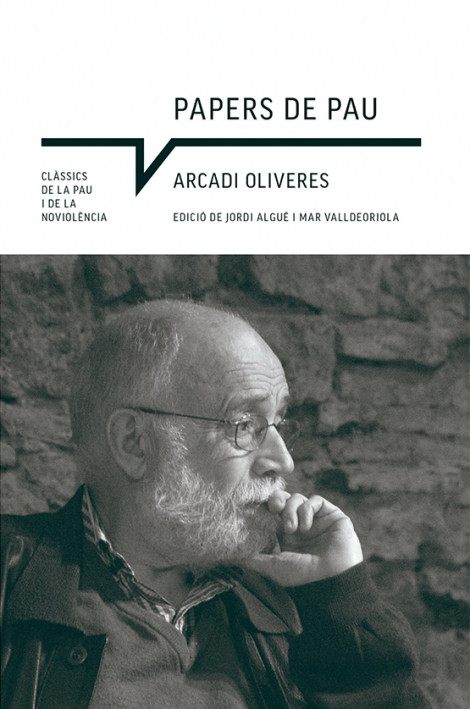A compilation of the pacifist legacy of Arcadi Oliveres
- Books
- Culture Folder
- Apr 23
- 4 mins

Arcadi Oliveres (1945-2021) was many things: teacher, inspirational figure, activist, writer, peace researcher, tireless lecturer, agitator of minds, etc., but, when it came to putting his pacifist thinking into writing, he was probably the most prolific writer of his generation. The endeavour to bring together a selection of his writings on peace in a single volume is both a fascinating and difficult undertaking. Jordi Algué and Mar Valldeoriola accepted the challenge, and the result – the book Papers de pau [Peace Papers], published by the International Catalan Institute for Peace and Angle Editorial – is outstanding. And it is excellent in several ways, at least on four counts, in my opinion.
Firstly, the volume is, in a way, a brief history of the peace movement in Catalonia and Spain, in which Oliveres was undoubtedly one of the pioneers and architects. As of the 1970s, his involvement in each and every one of the social demands linked to pacifism was unwavering, and the book bears testimony to that: the fight against the death penalty and the call for peace in the 1970s; the turbulent 1980s and the anti-NATO protests, which wreaked havoc, but which proved instrumental in bringing the pacifist movement together.
From that period, Algué and Valldeoriola also include one of the first articles written on tax objection, an issue that the peace movement later championed, but which until then had been largely unheard of in Catalonia. From the 1990s, the work against the disproportionate use of weapons, the war industry and the economic consequences of investment in arms are particularly noteworthy, as well as the defence of insubordination and the demand for 0.7% for development cooperation. As of the turn of the century, the demands of the peace movement diversified, branching out into a wider range of issues, and this is also reflected in the volume. A review of the writings of Arcadi Oliveres provides an insight into the movement’s evolution.
A propagator of positive peace
Secondly, Oliveres was a propagator in the broadest and noblest sense imaginable. A propagator of peace. And he did so using a huge variety of registers. The diversity of the texts collected in the volume attests to this. They range from letters sent to the president to the transcription of some of his legendary talks, texts analysing the status of the peace movement, newspaper articles and scientific writings resulting from his research work at the university. Arcadi was an all-rounder capable of adapting and modulating his discourse, to suit the audience and the objective pursued.
Arcadi Oliveres’ sense of humour, as well as his enormous wealth of knowledge and information, made his talks a source of great enjoyment.
Thirdly, when we talk about peace we often endeavour to convey the idea of a positive peace. Negative peace is understood as the absence of war, but pacifists do not only aspire to a world devoid of the use of explicit violence, we want to go beyond that; we believe in peace as something akin to the idea of justice. The absence of war alone is not enough; we must strive to achieve broader definitions of peace. Well, Oliveres and his thoughts and actions, which are so faithfully reflected in the book, translate this concept of positive peace. Because he did not only focus on fighting wars – which he also did –, but his work and his career help us to understand the need for positive peace in a broad sense.
 Book: Papers de pau. Jordi Algué & Mar Valldeoriola.
Book: Papers de pau. Jordi Algué & Mar Valldeoriola.Finally, and probably most importantly, the book provides us with a closer insight into the iconic figure of Arcadi Oliveres. For those of us who have had the good fortune to listen to his lectures so many times, rereading some of the transcripts proves nostalgic and evocative. When I do so, his voice echoes in my head. His sense of humour, as well as his enormous wealth of knowledge and information, made his talks a source of great enjoyment, which, thanks to the fact that they have been collected in this book, can now be remembered.
For those of us who were lucky enough to know him, the book is a way of staying close to him. Those who were not able to follow Arcadi Oliveres’ career throughout his life have a wonderful opportunity to do so by reading this book.
The book includes the article “Barcelona i l’esperit de la pau” [Barcelona and the Spirit of Peace], published in the Barcelona Metròpolis dossier “Peace in Movement”, No. 101 (October 2016).
Papers de pau [Peace Papers]
Jordi Algué and Mar Valldeoriola.
Institut Català Internacional per la Pau and Angle Editorial, 2022
344 pages
The newsletter
Subscribe to our newsletter to keep up to date with Barcelona Metròpolis' new developments




